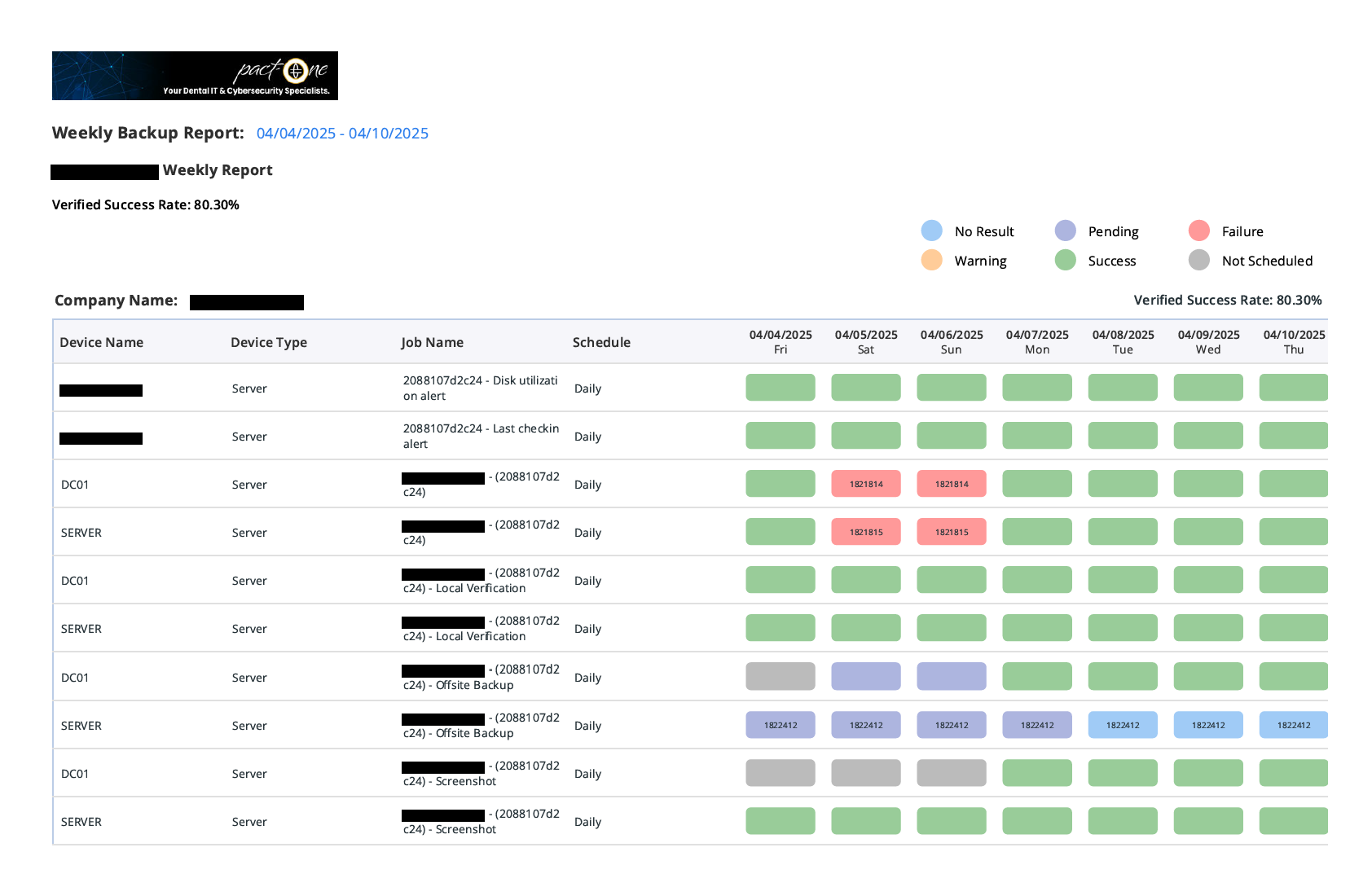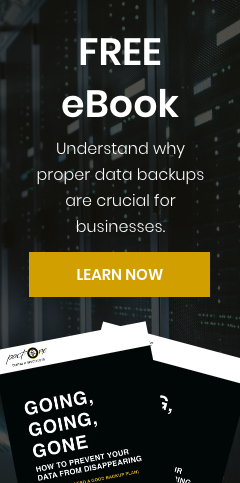You have a firewall, antivirus, and a login password. You’re covered, right?
Not quite.
Most dental practices don’t realize that cyberattacks don’t just target big hospitals or giant corporations. Hackers love going after smaller healthcare practices—especially dentists—because they often assume their IT is “just good enough.”
Here’s what that false sense of security is really costing you:
- Patient trust if sensitive data gets leaked
- Thousands in ransom if hit with a ransomware attack
- Fines for HIPAA violations if systems aren’t compliant
- Days or weeks of downtime during recovery
We’ve seen it all and we’ve helped practices recover. But we’d much rather help you avoid disaster in the first place.
5 Things Dentists Should Know About Cybersecurity
Cybersecurity can feel like an invisible threat, until it becomes a very real (and very expensive) problem. Most dental practices aren’t ignoring it on purpose...they just don’t know where the gaps are. And unfortunately, those gaps tend to show up after an attack. Here are five of the most common cybersecurity blind spots we see in dental practices and what you can do to fix them before it's too late.
1. Backups are Useless if They're Not Done Right
Yes, your data might be backed up. But is it encrypted? Tested regularly? Stored offsite?
We’ve worked with practices that thought they had solid backups until they ran into a network issue, and their backup files were outdated or completely inaccessible. Not ideal when your schedule, imaging, and patient records are on the line.
“Our previous IT guy had our office down for several weeks because he didn’t have the dental networking knowledge and tried to fix things by trial and error. On top of that, the inferior backup solution he provided put my data recovery at risk. Thanks to Pact-One, they quickly stepped in and got me back to work...I know with their backup solution, I’ll never have to worry about downtime again.” - Mark C.
2. HIPAA Compliance & Cybersecurity are Not a One-for-One Swap
HIPAA and cybersecurity aren’t interchangeable...but when combined, they form a strong, smart defense for your dental practice.
HIPAA compliance helps you meet regulatory requirements. It outlines how to handle patient data, implement access controls, and document safeguards. It’s your legal baseline and it’s non-negotiable.
But here’s the thing: compliance doesn’t automatically mean you’re secure.
That’s where cybersecurity steps in to go beyond the checklist. It brings proactive, real-time protection to the table such as monitoring for threats, locking down user access, stopping ransomware, and making sure your systems stay one step ahead of cybercriminals.
Think of it this way:
HIPAA is like a seatbelt.
Cybersecurity is your airbags, collision detection, and good set of brakes.
You need both to win.
3. Your Team is the Biggest Security Risk
It’s not intentional, but most breaches start with a simple mistake.
A front desk team member clicks a link in what looks like a legit email from a referring doctor. Boom...phishing attack. Suddenly your systems are locked, your emails are compromised, and you’re on the hook for a cyber nightmare.
According to Verizon Data Breach Investigations Report, over 60% of all data breaches stem from human error (such as provided in the example).
That’s why ongoing cybersecurity training isn’t optional anymore, it’s essential.
Check out the following resources to get started:
- Cybersecurity Training for New Dental Employees
- Essential Topics to Include in Your Employee Cybersecurity Training
- 7 Cybersecurity Best Practices Every Dental Team Member Should Know
- How to Train Your Dental Team to Recognize Phishing Emails
4. Old Hardware Creates New Risks
Still using computers from 2015? If they’re running outdated operating systems (like Windows 10 after October 2025), they won’t get security updates. That’s like leaving your front door wide open and hoping no one walks in.
Your technology doesn’t have to be cutting-edge, but it does need to be current and secure. Here’s how to tell if it’s time to upgrade.
5. Your IT Provider Might Only Be Doing the Bare Minimum
Most IT providers will set you up with the basics: a firewall, antivirus software, and maybe some endpoint protection. That’s a decent start...but with the evolving cyber threat landscape, it’s not nearly enough.
These tools are like locking your front door while leaving the windows wide open. They don’t stop phishing attacks, business email compromise, ransomware, or insider threats...all of which are increasingly common in dental practices.
If your IT provider isn’t layering your defenses with things like threat monitoring, encrypted backups, and email security...they’re just checking the box and not truly protecting your practice.
Cybersecurity can’t be a set-it-and-forget-it solution. You need a team that goes beyond the bare minimum and builds a multi-layered defense that grows with your practice and adapts to evolving threats.
| Security Tool | Basic IT Provider | Dental IT Provider |
|---|---|---|
| Antivirus & Firewall | ✅ | ✅ |
| Endpoint Protection | ✅ | ✅ |
| Vulnerability Scanning | ❌ | ✅ |
| 24/7/365 Threat Monitoring & Response | ❌ | ✅ |
| Encrypted Backups | ❌ | ✅ |
| Email Security (phishing protection, spam filtering, security awareness training) | ❌ | ✅ |
| Secure Remote Access | ❌ | ✅ |
| Password Management | ❌ | ✅ |
“Cybersecurity isn’t just about having tools, it’s about how you configure, monitor, and manage them over time. That’s where most IT providers fall short.” — Greg Richards, Chief Operations Officer, Pact-One Solutions
Find out what it takes for your practice to stand up against evolving cyber threats by grabbing the Ultimate Cybersecurity Guide for Dental Practices.
How to Protect Your Practice
You don’t need to know every detail about firewalls, endpoint detection, or multi-factor authentication. You just need the right partner to guide you.
At Pact-One Solutions, we work exclusively with dental practices, and we’ve built a cybersecurity framework designed to keep your systems protected, compliant, and running like clockwork.
Our approach includes:
- Business continuity when the unexpected hits
- Encrypted, tested, and secure backups (yes, we check them regularly)
- 24/7/365 monitoring by cybersecurity experts who detect and respond in real time
- Dental-specific tech support from people who understand your software
- Strategic tech planning to keep you future-ready, not stuck in the past
Instead of reacting to tech issues, you’ll be preventing them...and sleeping easier at night.
FAQs Dentists Ask Us About Cybersecurity
How do I know if my dental practice is secure?
Start with a cybersecurity assessment (also known as an IT Analysis). We’ll evaluate everything from data backups to network setup to help you identify vulnerabilities and recommend practical steps based on your unique setup. Most practices are surprised by what we uncover and relieved when we show them how easy it is to fix.
My IT provider says we already have antivirus and a firewall. Isn't that enough?
Not even close. Those are like the lock on your front door...but cybercriminals now come through windows, side doors, and even email links. True protection includes multi-layered defenses: 24/7/365 threat monitoring, phishing protection, employee training, and encrypted, tested backups. That’s where Pact-One goes beyond the bare minimum.
We're HIPAA-compliant, so why do we still need cybersecurity?
HIPAA compliance and cybersecurity work hand-in-hand, but they serve different purposes. HIPAA sets the rules; cybersecurity enforces them in real time. With both in place, you’re not just “checking boxes”, you’re protecting your practice, patients, and reputation.
How do I know if our backups are actually working?
Great question! And one many practices don’t think to ask until something goes wrong. At Pact-One, we don’t just set up backups; we test and verify them regularly to ensure they’re encrypted, recoverable, and ready to go when you need them most. If you have a dental IT provider, they should be able to provide you with a backup report, such as the one shown below.
Our computers are a few years old. Do we really need to upgrade?
If your systems are running outdated software (like Windows 10 after October 2025), they’ll soon stop receiving security updates...leaving your data exposed. We help practices plan hardware refreshes strategically, so you stay secure, compliant, and operational without disruption.
What's the best way to keep my team from clicking on phishing emails?
Regular cybersecurity awareness training. But the real key is continual reminders to reinforce the evolving threat landscape. We recommend full training at least once a quarter with weekly reminders during team huddles or through office communication. Alerting your team on current and evolving threats not only helps your business, but it helps your team members create better cyber habits in their personal life...extending cyber hygiene beyond your office.
What makes Pact-One different from my current IT provider?
We don’t do “good enough.” Through our 20+ years of serving dental practices, we've recognized the rise of digital threats in the dental industry. This is why our cybersecurity framework includes 24/7/365 active, real-time threat monitoring in addition to basic network security such as antivirus, firewall, and endpoint protection. We’re your team behind the scenes, protecting what you’ve worked so hard to build.
You Deserve Better Than "Too Little, Too Late"
If you’re still relying on “good enough” IT (or hoping your antivirus is doing the trick) you’re not alone. But the cost of inaction is growing every year.
Let’s flip the script: from reactive to proactive, vulnerable to protected.
Schedule a Dental Cybersecurity Checkup with Pact-One Today
Because the best time to secure your practice was yesterday. The next best time? Right now.
Dental IT. Remove the Burden. Embrace the Use.
Quality patient care – it's ultimately why you became a dental professional. But, some business operations can get in the way (such as pesky computer issues or lack of IT support). That’s where Pact-One Solutions can help! Our passion lies in supplying reliable, responsive dental IT support and security that practices can count on.
Whether you’re looking for dental IT services for your startup or searching for more responsive dental IT support – our team of dental IT specialists have you covered. With team members throughout the United States, we offer nationwide support to dental practices of all sizes, specialties, and stages of growth. Our wide range of dental IT services ensure your data is secure, accessible, and protected.
Don't let technology challenges hinder your ability to deliver exceptional dental care. Contact us at info@pact-one.com or 866-722-8663 to join over 3,000 dental professionals thriving with the support of a dedicated dental IT team.




You must be logged in to post a comment.